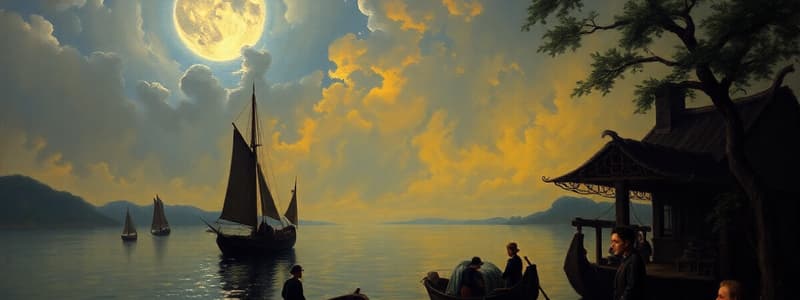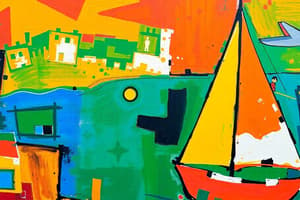Podcast
Questions and Answers
What was one of the significant actions taken by Nobunaga during his rule?
What was one of the significant actions taken by Nobunaga during his rule?
- He established total isolation from other countries.
- He was the first to use firearms effectively in battle. (correct)
- He ordered all missionaries to leave Japan.
- He banned firearms completely.
What was Tokugawa Ieyasu's primary achievement in Japan's political structure?
What was Tokugawa Ieyasu's primary achievement in Japan's political structure?
- He abolished the samurai class.
- He defeated Nobunaga in battle.
- He initiated widespread land reforms for peasants.
- He established the shogunate, becoming the first shogun. (correct)
Which of the following describes Hideyoshi's approach towards Christianity?
Which of the following describes Hideyoshi's approach towards Christianity?
- He aggressively promoted Christianity among the Japanese.
- He completely ignored the presence of missionaries in Japan.
- He showed consistent opposition to missionaries throughout his rule.
- He initially welcomed missionaries but later imposed restrictions. (correct)
What led to the beginning of Japan's period of isolation?
What led to the beginning of Japan's period of isolation?
What was the impact of the land revolts mentioned in the content?
What was the impact of the land revolts mentioned in the content?
What motivated Portugal's early exploration efforts?
What motivated Portugal's early exploration efforts?
Which product was notably desired by Europeans from Asian markets?
Which product was notably desired by Europeans from Asian markets?
What was a key feature of the mercantilist system?
What was a key feature of the mercantilist system?
What was one consequence of the joint-stock company innovation?
What was one consequence of the joint-stock company innovation?
Why did European countries, such as England and the Netherlands, become involved in Indian Ocean trade?
Why did European countries, such as England and the Netherlands, become involved in Indian Ocean trade?
What was the significance of the Ming dynasty's approach to European contact?
What was the significance of the Ming dynasty's approach to European contact?
What social system influenced Indian society during the period of conversion to Christianity?
What social system influenced Indian society during the period of conversion to Christianity?
Which factor contributed to the famine during the Ming dynasty's decline?
Which factor contributed to the famine during the Ming dynasty's decline?
Flashcards
Land Inequality
Land Inequality
Unequal distribution of land ownership, often leading to peasant revolts due to high rent.
Daimyo
Daimyo
Powerful Japanese warlords during the Sengoku period.
Nobunaga
Nobunaga
Powerful Japanese warlord who used firearms and tactics to consolidate power.
Hideyoshi
Hideyoshi
Signup and view all the flashcards
Portugal's Exploration
Portugal's Exploration
Signup and view all the flashcards
Asian Sea Trade Network
Asian Sea Trade Network
Signup and view all the flashcards
Tokugawa Ieyasu
Tokugawa Ieyasu
Signup and view all the flashcards
Mercantilism
Mercantilism
Signup and view all the flashcards
Shogun
Shogun
Signup and view all the flashcards
Joint-Stock Company
Joint-Stock Company
Signup and view all the flashcards
Japanese Isolation
Japanese Isolation
Signup and view all the flashcards
Dutch in the Spice Islands
Dutch in the Spice Islands
Signup and view all the flashcards
Age of Exploration
Age of Exploration
Signup and view all the flashcards
Missionaries
Missionaries
Signup and view all the flashcards
Religious Motivation in Exploration
Religious Motivation in Exploration
Signup and view all the flashcards
Ming China
Ming China
Signup and view all the flashcards
Columbian Exchange (Impact on Population)
Columbian Exchange (Impact on Population)
Signup and view all the flashcards
Columbian Exchange (Factors)
Columbian Exchange (Factors)
Signup and view all the flashcards
Study Notes
Portuguese Exploration and Asian Sea Trade
- Portugal led early exploration, seeking spices for trade.
- Vasco da Gama found a route to the Spice Islands (in the Indies).
- Portugal sought spices, trade opportunities, and to preserve food better through salt.
- Asian Trade route included Sri Lanka (cinnamon), China (silk, porcelain), India (cotton, spices) and Arab nations (perfumes, glassware).
- Europeans had negative trade balances with all these regions, primarily trading silver.
Mercantilism
- Mercantile systems (like Portugal initially) were controlled by government.
- Government wanted to hoard precious metals (positive trade balance) and took 40% of whatever was discovered.
Second Wave of Exploration (English, Dutch, French)
- English, Dutch, French joined the Indian Ocean trade.
- Dutch took over the Spice Islands from Portugal.
- Improvements in trade included joint-stock companies and stock exchanges. This placed invested capital (money) in the hands of the people, not just the government.
- This led to faster growth and increased profit opportunities.
Religious Motivations
- Europe's desire for conversion drove missionary efforts in Asia.
- Missionaries targeted India, Philippines, and other areas.
- Conversions were common amongst lower classes in India hoping to climb the social ladder.
Spain's Exploration
- Spain primarily focused on westward exploration, including the Philippines.
- Portugal focused on eastward exploration.
- Both countries sought trade and conversion in Asia.
- Brazil became a Portuguese colony.
Ming China (1368-1644)
- Ming China initially traded with Europeans, but increasingly limited contact.
- Ming China was largely ethnocentric, and became isolated to limit foreign interaction.
- Ming China developed a Neo-Confucianist understanding
- Ming China had a patriarchal Confucian rule with examination system and foot binding practices.
The Columbian Exchange
- The exchange of goods fostered significant population growth in some areas.
- Stable crops like potatoes, sweet potatoes, and corn were introduced, increasing food availability and population growth.
- However, climate change (mini ice age) and famine threatened populations in the affected areas.
- Population boom from 80-120 million.
Land Demands and Revolts
- Growing populations increased demands for land, creating tensions between the land owners and peasants.
- Land revolts occurred as rent increased due to landlord influence and limited land access.
Japanese Reunification & Isolation
- Japan's reunification led to the growth of Daimyo (lords), culminating in the rule of Tokugawa Ieyasu.
- Initial Japanese leaders (Nobunaga, Hideyoshi) were interested in trade but saw missionaries as threatening.
- Tokugawa Ieyasu, who installed a Shogunate, ordered the isolation of Japan and the banning of Christianity.
- International trade and travel were forbidden.
- The Dutch received an exception to this rule allowing a limited amount of trade.
Studying That Suits You
Use AI to generate personalized quizzes and flashcards to suit your learning preferences.




